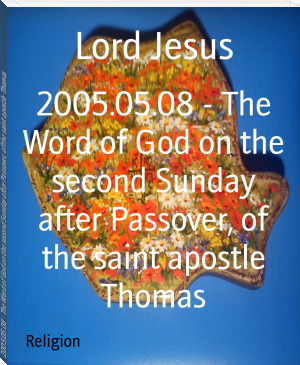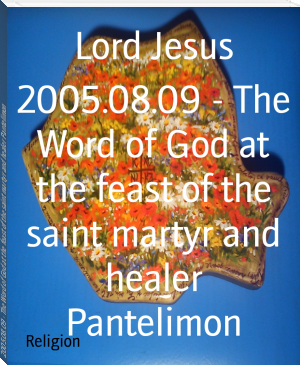The Story of a Soul - Saint Thérèse de Lisieux (best color ereader .TXT) 📗

- Author: Saint Thérèse de Lisieux
- Performer: -
Book online «The Story of a Soul - Saint Thérèse de Lisieux (best color ereader .TXT) 📗». Author Saint Thérèse de Lisieux
It is true I am not always faithful, but I never lose courage. I leave myself in the Arms of Our Lord. He teaches me to draw profit from everything, from the good and from the bad which He finds in me.[33] He teaches me to speculate in the Bank of Love, or rather it is He Who speculates for me, without telling me how He does it—that is His affair, not mine. I have but to surrender myself wholly to Him, to do so without reserve, without even the satisfaction of knowing what it is all bringing to me. . . . After all, I am not the prodigal child, and Jesus need not trouble about a feast for me, because I am always with Him.[34]
I have read in the Gospel that the Good Shepherd leaves the faithful ones of His flock in the desert to hasten after the lost sheep. This confidence touches me deeply. You see He is sure of them. How could they stray away? They are prisoners of Love. In like manner does the Beloved Shepherd of our souls deprive us of the sweets of His Presence, to give His consolations to sinners; or if He lead us to Mount Thabor it is but for one brief moment . . . the pasture land is nearly always in the valleys, "it is there that He takes His rest at mid-day."[35]
XVIIOctober 20, 1893.
MY DEAR SISTER,—I find in the Canticle of Canticles this passage which may be fitly applied to you: "What dost thou see in thy beloved but a band of musicians in an armed camp?"[36] Through suffering, your life has in truth become a battle-field, and there must be a band of musicians, so you shall be the little harp of Jesus. But no concert is complete without singing, and if Jesus plays, must not Céline make melody with her voice? When the music is plaintive, she will sing the songs of exile; when the music is gay, she will lilt the airs of her Heavenly Home. . . .
Whatever may happen, all earthly events, be they happy or sad, will be but distant sounds, unable to awake a vibration from the harp of Jesus. He reserves to Himself alone the right of lightly touching its strings.
I cannot think without delight of that sweet saint, Cecilia. What an example she gives us! In the midst of a pagan world, in the very heart of danger, at the moment when she was to be united to a man whose love was so utterly of earth, it seems to me as if she should have wept and trembled with fear. But instead, "during the music of the marriage-feast Cecilia kept singing in her heart."[37] What perfect resignation! No doubt she heard other melodies than those of this world; her Divine Spouse too was singing, and the Angels repeated in chorus the refrain of Bethlehem's blessed night: "Glory to God in the highest, and on earth peace to men of goodwill."[38]
The Glory of God! St. Cecilia understood it well, and longed for it with all her heart. She guessed that her Jesus was thirsting for souls . . . and that is why her whole desire was to bring to Him quickly the soul of the young Roman, whose only thought was of human glory. This wise Virgin will make of him a Martyr, and multitudes will follow in his footsteps. She knows no fear: the Angels in their song made promise of peace. She knows that the Prince of Peace is bound to protect her, to guard her virginity, and to make her recompense. . . . "Oh, how beautiful is the chaste generation!"[39]
Dearest sister, I hardly know what I write; I let my pen follow the dictates of my heart. You tell me that you feel your weakness, but that is a grace. It is Our Lord Who sows the seeds of distrust of self in your soul. Do not be afraid! If you do not fail to give Him pleasure in small things, he will be obliged to help you in great ones.
The Apostles laboured long without Him, they toiled a whole night and caught no fish. Their labours were not inacceptable to him, but He wished to prove that He is the Giver of all things. So an act of humility was asked of the Apostles, and Our loving Lord called to them: "Children, have you anything to eat?"[40] St. Peter, avowing his helplessness, cried out: "Lord, we have laboured all the night, and have taken nothing."[41] It is enough, the Heart of Jesus is touched. . . . Had the Apostle caught some small fish, perhaps our Divine Master would not have worked a miracle; but he had caught nothing, and so through the power and goodness of God his nets were soon filled with great fishes. Such is Our Lord's way. He gives as God—with divine largesse—but He insists on humility of heart.
XVIIIJuly 7, 1894.
MY DEAR LITTLE SISTER,—I do not know if you are still in the same frame of mind as when you last wrote to me; I presume that you are, and I answer with this passage of the Canticle of Canticles, which explains so well the state of a soul in utter dryness, a soul which cannot find joy or consolation in anything: "I went down into the garden of nut-trees to see the fruits of the valleys, and to look if the vineyard had flourished, and the pomegranates were in bud. I no longer knew where I was: my soul was troubled because of the chariots of Aminadab."[42]
There is the true picture of our souls. Often we go down in the fertile valleys where our heart loves to find its nourishment; and the vast fields of Holy Scripture, which have so often opened to yield us richest treasures, now seem but an arid and waterless waste. We no longer even know where we stand. In place of peace and light, all is sorrow and darkness. But, like the Spouse in the Canticles, we know the cause of this trial: "My soul was troubled because of the chariots of Aminadab." We are not as yet in our true country, and as gold is tired in the fire so must our souls be purified by temptation. We sometimes think we are abandoned. Alas! the chariots—that is to say, the idle clamours which beset and disturb us—are they within the soul or without? We cannot tell, but Jesus knows; He sees all our grief, and in the night, on a sudden, His Voice is heard: "Return, return, O Sulamitess: return, return, that we may behold thee."[43]
O gracious call! We dared no longer even look upon ourselves, the sight filled us with horror, and Jesus calls us that He may look upon us at leisure. He wills to see us; He comes, and with Him come the other two Persons of the Adorable Trinity to take possession of our soul.
Our Lord had promised this, when, with unspeakable tenderness, He had said of old: "If anyone love Me he will keep My word, and My Father will love him, and We will come to him, and will make Our abode with him."[44] To keep the word of Jesus, then, is one condition of our happiness, the proof of our love for Him; and this word seems to me to be His very Self, for He calls Himself the Uncreated Word of the Father.
In the same Gospel of St. John He makes the sublime prayer: "Sanctify them by Thy word, Thy word is truth."[45] And in another passage Jesus teaches us that He is "the Way and the Truth and the Life."[46] We know, then, what is this word which must be kept; we cannot say, like Pilate: "What is truth?"[47] We possess the Truth, for our Beloved dwells in our hearts.
Often this Beloved is to us a bundle of myrrh.[48] We share the chalice of His sufferings; but how sweet it will be to us one day to hear these gentle words: "You are they who have continued with Me in My temptations, and I dispose to you, as My Father hath disposed to Me, a kingdom."[49]
XIXAugust 19, 1894.
This is perhaps the last time that I need have recourse to writing in order to talk to you, my dear little sister. God in His goodness has granted my dearest wish. Come, and we will suffer together . . . Then Jesus will take one of us, and the others will remain in exile yet a little longer. Now, listen well to what I am going to say: God will never, never separate us; and if I die before you, do not think that I shall be far away—never shall we have been more closely united. You must not be grieved at my childish prophecy. I am not ill, I have an iron constitution; but the Lord can break iron as if it were clay.
Our dear Father makes his presence felt in a way which touches me deeply. After a death lasting for five long years, what joy to find him as he used to be, nay, more a father than ever! How well he is going to repay you for the care you so generously bestowed on him! You were his Angel, now he will be yours. He has only been one month in heaven, and already, through the power of his intercession, all your plans are succeeding. It is easy for him now to arrange matters for us, and he has had less to suffer on Céline's account than he had for his poor little Queen.
For a long time you have been asking me for news about the noviciate, especially about my work, and now I am going to satisfy you. In my dealings with the novices I am like a setter on the scent of game. The rôle gives me much anxiety because it so very exacting. You shall decide for yourself if this be not the case. All day long, from morn till night, I am in pursuit of game. Mother Prioress and the Novice Mistress play the part of sportsmen—but sportsmen are too big to be creeping through the cover, whereas a little dog can push its way in anywhere . . . and then its scent is so keen! I keep a close watch upon my little rabbits; I do not want to do them any harm, but I tell them gently: "You must keep your fur glossy, and must not look foolishly about as does a rabbit of the warren." In fact, I try to make them such as the Hunter of Souls would have them, simple little creatures that go on browsing heedless of everything else.
I laugh now, but seriously I am quite convinced that one of these rabbits—you know which one I mean—is worth a hundred times more than the setter; it has run through many a danger, and I own that, had I been in its place, I should have long since been lost for ever in the great forest of the world.
XXI am so glad, dearest Céline, that you do not feel any particular attraction at the thought of entering the Carmel. This is really a mark of Our Lord's favour, and shows that He looks for a gift from your hands. He knows that it is so much sweeter to give than to receive. What happiness to suffer for Him Who loves us even unto folly, and to pass for fools in the eyes of the world! We judge others by ourselves, and, as the world will not hearken to reason, it calls us unreasonable too.
We may console ourselves, we are not the first. Folly was the only crime with which Herod





Comments (0)